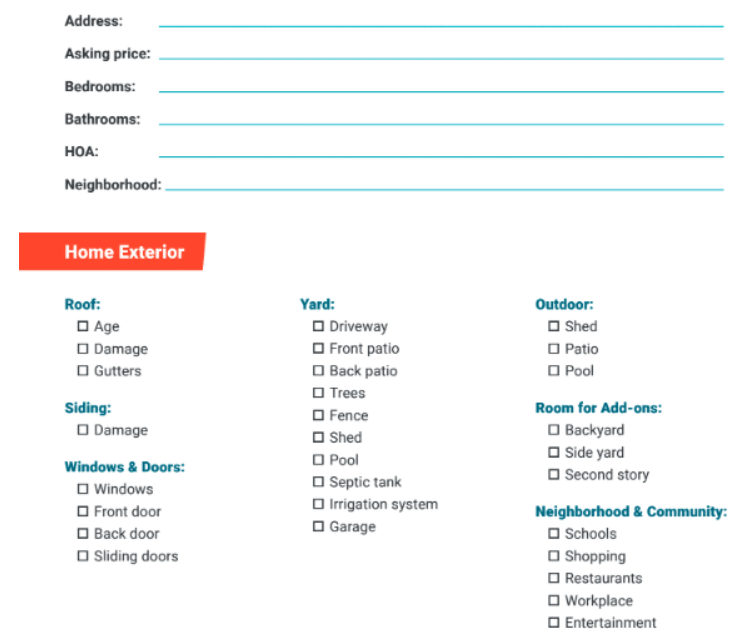The Ultimate Home Buying Checklist & Field Guide

1) Get the Green Light
You need to be pre-approved for a mortgage before
starting your house hunt. This shows that you and the seller/agent of the listing you like that you have
the funds to buy. It also provides a realistic picture of the fixed and monthly costs associated with the price point you're interested in. It just takes a bit of preparation and a quick phone call or email
to a lender to get started (I have a list of highly reputable, excellent lenders if you'd like a recommendation!).
PRE-APPROVAL CHECKLIST:
- Copies of driver’s licenses and social security cards
- Recent pay stubs and W2s for the past two years
(or 1099s) - Most recent two months of bank statements
l Last two years of tax returns (1040) - Profit and loss statements (if self-employed
or own a business)
Ready to Buy?
No need to stress. The buying process is exciting and
you’ll be raiding home decor stores before you know it.
The key to a successful home search experience is
knowing what you’re looking for. Among other things,
that means distinguishing between “must-haves” and
“like-to-haves.” Write notes, impressions, and the age/conditions of items in the home. This will help you to evaluate each home to determine if they are the right fit.
 2) Start to Shop
2) Start to Shop
Now for the fun stuff. Search for homes online or use a Realtor to create a home search from the multiple listing service for the most up-to-date access to new listings, as well as handpicked homes that fit
your needs. Once your top picks are identified, your agent can schedule showings to view them in person.
3) Found the One? Present the Offer
When you fall in love with a home, your agent can write up an
offer to purchase it. These contracts specify
a sale price and include clauses for various terms, such as closing and possession dates, deposit
amount, and other conditions.
Once presented, the
seller can accept your offer, reject it, or counter to
initiate the negotiation process.
Negotiate the Deal:
Negotiating the transaction is usually the most complex
aspect of buying a home. To win the negotiation:
- present yourself as a serious buyer and know your local market values
- keep emotions in check, leverage offer strengths
- be creative in your approach regarding timelines and terms
- If necessary, be willing to compromise
to get the deal done.

NEGOTIATION CHECKLIST:
- Determine the purchase price. Include contingencies, such as financial, inspection, or purchase
- Spell out any special requests and repairs you want included
- Determine an earnest money amount (deposit)
- Define a move-in date
- Once both parties agree to the terms, sign the purchase and sale agreement
4) Look Under the Hood:
Hire a professional, third-party home
inspector to take a closer look at the home and confirm
that it’s in good shape. The goal is to evaluate it from a
structural and safety standpoint to ensure that you’re
buying a hazard-free, up-to-code property that’s a good
investment. Usually, the inspection period is one to
two weeks from the date your sales contract is signed,
although it depends on your specific agreement.

HOME INSPECTION CHECKLIST:
- Prepare for inspection by looking for areas you want
the inspector to give special attention to. Look for
evidence of leaks, cracks, obvious malfunctions,
dampness, odors, soggy areas around the exterior of the home, etc. - Consider getting inspections for structural
engineering issues, sewer line/septic, and roof. - Use the inspection reports to re-negotiate if
necessary.
5) Apply for the Loan:
Once you have a pending agreement, it’s time to go
back to your chosen lender to finalize your mortgage
details to close the deal. This means finalizing your
down payment, interest rate, payment schedule, and
any other financial conditions.
It’s critical to fully understand your financing decisions
regarding your mortgage. Generally, there are two
types of mortgages: a fixed-rate mortgage with an
interest rate that remains the same for the life of the
loan, or an adjustable-rate mortgage (ARM) with a rate
that adjusts depending upon economic trends. Another
consideration is the term or length of the loan, as well as interest rate credits or closing cost grants.
6) Gather Documents:
The list of documents needed for a mortgage
application can seem daunting, but it doesn’t have
to be if you’re prepared. If you’ve been pre-approved,
you may only need to give some updated information
to your lender.

MORTGAGE APPLICATION CHECKLIST:
- Recent pay stubs and W2s for the past two years
(or 1099s) - The most recent two months of bank statements
- Last 2 years of tax returns
l Profit and loss statements (if self-employed
or own a business) - Retirement/investment account statements
l Gift letter (if using gift funds)
l Signed sales agreement
7) Confirm the Value:
If getting a mortgage, your potential new home needs
to be appraised, which is an unbiased estimate of what it's worth. Your lender needs to make sure the house
you’re trying to buy is valued at or above the price
you’re paying for it.
This is because the lender needs to make a wise
financial investment. If they loan you money for a
house, and it isn’t worth what you’re paying for it,
they put themselves in a bad position, too. It’s natural
for you to be a little bit worried about the appraisal,
but the majority of homes appraise at or above their
contract price, so that should help put your mind
at ease.
8) Get Covered:
Homeowner’s insurance needs to be purchased before
the closing. Should the unexpected occur, it will protect
your house and belongings. (Let me know if you'd like me to connect you with
a rep who can shop the most competitive rates).

HOMEOWNER’S INSURANCE CHECKLIST:
- Determine how much coverage you need.
- Know your credit score. Companies may consider
your score when deciding whether to sell you
insurance and at what price. - Gather information about the house.
- Find out if the house is in a designated flood plain.
- Make a detailed inventory of your property. If you
have expensive items such as jewelry or artwork,
consider buying endorsements to add or increase
coverage for these items.
9) Make it Official:
A title search is conducted to make sure your
property’s title is valid. This thorough examination
takes place to ensure that you’ll become the rightful
new owner of the property, free of any liens.
The title insurance company will look at deeds, wills,
and trusts, tracing the history of the property back
many years.
10) Take a Final Tour:
Visit your new house one last time to make sure
everything is on point. Double-check that any updates
you negotiated have been made.

FINAL WALK THROUGH CHECKLIST:
- Are all items you’ve purchased with the house
still present? - Has all personal property and unwanted items been
removed according to the terms of your contract? - Have all necessary repairs been made?
- Is there any damage to the walls or other
areas caused by movers? - Is the home in the same condition as was when you first toured it?
- Is landscaping as you remember?
11) Get the Keys:
It’s the moment you’ve been waiting for. Closing
time! You’ll receive the property title and copies
of all documentation pertaining to the purchase.

WHAT TO BRING TO THE CLOSING:
- Any paperwork the bank required to approve your loan
- A government-issued photo ID. (A note to newlyweds who just changed their name: The ID needs to match the name that will appear on the property’s title and mortgage.)
- Your certified funds
12) Move-in Day:
Let the many memories begin!

- Pack a box of things to move yourself so you have
access to them easily. (Cell phone, tool kit, scissors,
trash bags, paper towels, toilet paper and bed
linens.) - Have extra packing material on hand for last-minute things.
- In the new home, tape names to doors to assist
movers; map floor layout so movers know what’s
going where. - Double-check the arrangements you made for your
pet. - Do a final sweep of your home. Make sure you
clean the house you are leaving. - Double-check that your utilities will be hooked up.
About Josh Gold - Associate Broker, Max Broock Realtors:

My primary focus is providing the highest level of service and the “best price possible” for my clients in today's market. Whether you're interested in buying, selling, leasing, or investing, I actively pursue deals for my clients that match up with their specific goals and dreams. As a Michigan native, a graduate of Oakland University, and an Associate Broker for the #1 selling real estate company in Michigan, you can be confident my knowledge and expertise will prove to be invaluable for all your real estate needs.
CONTACT ME TO SCHEDULE A NO-OBLIGATION CONSULTATION:
Direct: 248.890.3909
Office: 248.644.6700
email: joshgold@maxbroock.com
Home Buyer's Glossary:
- Abstract Of Title – A complete historical summary of public records relating to the legal ownership of a particular property.
- Adjustable Rate Mortgage (ARM) – (variable-rate loan.) An ARM is a loan in which the interest rate changes over time, relative to an index like the Treasure index.
- Agreement of Sale – (contract of purchase, purchase agreement, or sales agreement.) A contract in which a seller and buyer agree to transact under certain terms spelled out in writing and signed by both parties.
- Amortization – The process of reducing the principal debt through a schedule of fixed payments at regular intervals, with an interest rate specified in a loan document.
- Appraisal – A professional appraiser’s estimate of the market value of a property based on local market data and the recent sale prices of similar properties.
- Assessed Value – Value placed on a home by municipal assessors to determine property taxes.
- Closing – Final steps in the transfer of property ownership. On the closing date, as specified by the sales agreement, the buyer inspects and signs all documents relating to the transaction, and final disbursements are paid. (Also referred to as settlement.)
- Closing Costs – Costs to complete real estate transactions in addition to home price. May include: points, taxes, title insurance, appraisal fees, and legal fees.
- Contingency – Clause in the purchase contract that describes conditions that must be met and agreed upon by both buyer and seller before the contract is binding.
- Counter-offer – Offer, made in response to a previous offer, that rejects all or part of it while enabling negotiations to continue towards a mutually-acceptable sales contract.
- Conventional Mortgage – One that is not insured or guaranteed by the federal government.
- Debt-to-Income Ratio – Measures total debt burden by dividing gross monthly debt repayments, including mortgages, by gross monthly income.
- Down Payment – Money paid by the buyer to the lender at the time of closing. The amount is the difference between the sales price and the mortgage loan. Requirements vary by loan. Down payments of less than 20% usually require mortgage insurance. Earnest Money – A deposit given by the buyer to bind a purchase offer and held in escrow. If the property sale is closed, the deposit is applied to purchase price. If the buyer does not fulfill all contract obligations, the deposit may be forfeited.
- Equity – Value of property, less loan balance, and any outstanding liens or other debts against the property.
- Easements – Legal right of access to property by individuals or groups for specific purposes. Easements may affect property values and can be part of the deed.
- Escrow – Funds held by a neutral third party (the escrow agent) until certain conditions of the contract are met and funds can be paid out. Escrow accounts are also used by loan servicers to pay property taxes and homeowner’s insurance.
- Fixed-Rate Mortgage – A type of mortgage loan in which the interest rate does not change during the entire term of the loan. Home Inspection – Professional inspection of a home, paid for by the buyer, to evaluate the quality and safety of its plumbing, heating, wiring, appliances, roof, etc.
- Homeowner’s Insurance – A policy that protects you and the lender from fire or flood, a liability such as a visitor injury, or damage to your personal property.
- Lien – A claim or charge on property for payment of a debt. With a mortgage, the lender has the right to take title to the property if you don’t make mortgage payments.
- Market Value – Amount a willing buyer would pay a willing seller for a home. The appraised value is an estimate of current market value.
- Mortgage Insurance – Purchased by the buyer to protect the lender in the event of default (typically for loans with less than 20% down). Available through a government agency like the FHA or private mortgage insurers (PMI).
- Possession Date – The date, as specified by the sales agreement, that the buyer can move into the property. Generally, it occurs within a couple of days of the closing date.
- Pre-Approval Letter – A letter from a mortgage lender that a buyer qualifies for a mortgage of a specific amount. It also shows home sellers that you’re a serious buyer.
- Principal – Amount of money borrowed from a lender to buy a home, or amount of loan that has not yet been repaid. Does not include interest paid to borrow.
- Purchase Offer – Detailed, written document which makes an offer to purchase a property, and which may be amended several times in the process of negotiations. When signed by all parties involved in the sale, the purchase offer becomes a legally binding sales agreement.
- Title – Right to, and the ownership of, property. A title or deed is sometimes used as proof of ownership of land. Clear title refers to a title that has no legal defects.
- Title Insurance – An insurance policy that guarantees the accuracy of title search and protects lenders and homeowners against legal problems with title.
- Truth-In-Lending Act (TILA) – Federal law that requires disclosure of truth-in-lending statements for consumer loans – includes a summary of the total cost of credit.
- Title Search – Historical review of all legal documents relating to ownership of the property to determine if there have been any flaws in prior transfers of ownership or if there are any claims or encumbrances on the property.




